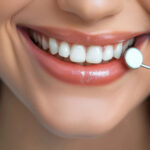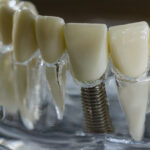Are you considering getting dental implants but are concerned about the level of pain involved? Rest assured, dental implant surgery is generally not as painful as you might think. With advancements in technology and anesthesia, oral surgeons are able to ensure a comfortable and virtually pain-free experience for their patients.
How Painful is Getting Dental Implants?
Like any surgical procedure, some discomfort and swelling can be expected after dental implant surgery. However, patients often find that the level of discomfort is manageable and that it diminishes quickly within a few days. To help you manage any discomfort effectively, our oral surgeons may recommend the following:
- Over-the-counter pain medication or prescribed analgesics to alleviate pain.
- Applying ice packs to the outside of your jaw to reduce swelling.
- Eating soft foods and avoiding hard, crunchy, or hot foods for the initial few days.
- Avoiding strenuous activities and exercise that may interfere with the healing process.
Following our oral surgeon’s instructions for proper oral hygiene, including gentle brushing, flossing, and rinsing with a prescribed mouthwash.
Swelling Management and Pain Control
Swelling and pain are common after dental implant surgery. While exercise is beneficial for reducing swelling in other parts of the body, it is essential to take precautions when it comes to your implant site. Here are some tips to help manage swelling and pain:
- Apply a cold compress or ice pack to your face in the first 24-48 hours after surgery.
- Take prescribed medications as directed by your dentist or oral surgeon.
Avoid hot or spicy foods and drinks, as they can further irritate the surgical site. - Practice gentle jaw exercises post-surgery to promote healing and reduce swelling.
Preventing Complications and Ensuring Oral Health
- Practice meticulous oral hygiene by brushing and flossing regularly. Be gentle around the implant site to avoid disrupting the healing process.
- Keep all scheduled follow-up appointments with your dental team to monitor your progress and address any concerns.
- Avoid smoking or using tobacco products, as they can hinder the healing process and increase the risk of implant failure.
- Avoid consuming hard or sticky foods that may put excessive pressure on the implant site, potentially causing damage.
If you experience any complications or notice any unusual symptoms, contact your dental team immediately for guidance and assistance.
Medications for Dental Implant Pain Management
Dentists typically prescribe a combination of medications to manage pain and discomfort following dental implant surgery. The specific medications and their dosages may vary from patient to patient, depending on individual needs and the extent of the procedure. Here are some common medications used for dental implant pain management:
- Over-the-Counter Pain Relievers: Non-prescription pain relievers like ibuprofen (Advil) or acetaminophen (Tylenol) can help manage mild to moderate pain. Follow your dentist’s instructions for dosing.
- Prescription Pain Medications: In some cases, your dentist may prescribe stronger pain medications, such as opioids, for more severe pain. These should be used strictly as directed and for a short duration to avoid dependence.
- Antibiotics: To prevent infection, your dentist may prescribe antibiotics. Be sure to complete the entire course as prescribed.
- Anti-Inflammatory Medications: Non-steroidal anti-inflammatory drugs (NSAIDs) like naproxen (Aleve) or prescription-strength alternatives can help reduce swelling and inflammation.
- Mouthwash or Gargles: Your dentist may recommend an antimicrobial mouthwash or salt water rinses to maintain oral hygiene and soothe the surgical site.
- Ice Packs: Applying ice packs to the outside of your cheek can help reduce swelling and numb the area temporarily.
- Soft Diet: Stick to a soft diet in the days following surgery to minimize irritation to the surgical site.
- Prescription Oral Gels: Some patients find relief from topical gels or ointments prescribed by their dentist to numb the surgical area.
Physical Activities Allowed After Dental Implants
After undergoing dental implant surgery, it’s important to be cautious about physical activities to ensure a smooth recovery. Here, we outline the physical activities that are generally allowed during the healing process:
- Walking: Light walking is encouraged to promote blood circulation and overall well-being.
- Gentle Stretching: Basic stretching exercises can help alleviate muscle tension, but avoid straining the jaw area.
- Low-Impact Cardio: Activities like stationary biking or light swimming can be considered after consulting your dentist.
- Daily Oral Hygiene: Continue regular oral care with gentle brushing and rinsing, avoiding the surgical area.
- Rest and Relaxation: Give your body ample time to heal by getting sufficient rest and sleep.
While it’s crucial to stay active and maintain oral hygiene, it’s equally important to avoid heavy activities that could disrupt the healing process. Always follow your dentist’s specific instructions for a successful dental implant recovery.
At Madison Dentistry & Implant Center, we focus on making your experience comfortable and pain-free. Our experienced oral surgeons and dedicated team will guide you through your dental implant journey, making it as seamless as can be. If you have questions or want to know more about dental implants, feel free to schedule a consultation with our skilled oral surgeons. Contact us today at 973-822-8003.




